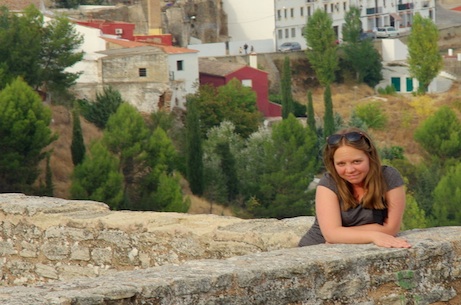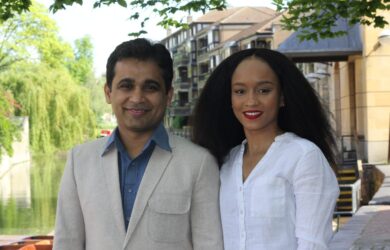
Stephanie Mawson's research into the colonisation of the Philippines and the role of ordinary Filipinos in that process aims to shed light on a marginalised part of global history.
The history of the transportation of convicts between Mexico and the Philippines is little studied and throws up interesting and often messy details about the nature of colonisation in the 17th century which do not fit common conceptions.
Stephanie Mawson came to that history as a result of travelling around Latin America as an undergraduate and deciding to do her honours thesis and later her MPhil, which included the role of indigenous Filipinos in the Spanish military, on the historical links between Mexico and the Philippines.
She says: “I was always struck by how often the Philippines was excluded – not just from Latin American history, but from Pacific and global history – despite having played such a pivotal role in global development. What literature did exist also focussed exclusively on the interests of the elite Spaniards engaged in the project of colonising the Philippines and denied the agency of ordinary people – Spanish, Mexican, Filipino and everyone in between. This made me realise that marginalisation is a reality not only in the sense of geo-politics or global economics, but also in terms of how we understand global historical development.”
Stephanie, a social justice activist, believes that ordinary people – and especially indigenous people – play a much larger role in the history of global interaction than they are ever given credit for.
For her PhD which she begins in the autumn she will look more at social organisation amongst indigenous Filipinos and study a broader sweep of south east Asia, taking in the trading networks between different countries and the politics of different indigenous communities in the 17th century.
She says: “Challenging social inequality and marginalisation has always been an aim of my academic pursuits. I have always believed that we study history not just to understand the past but also to engage in the kind of future that we want to create. As a society, our understanding of history shapes our understanding of the world, and the role that historians have played in writing that history is essential.”
Childhood
Stephanie was born and grew up in Melbourne. Her mother is a health sociologist who runs her own network of organisations which represent people with chronic illness. Her father, who is deceased, ran his own software engineering business.
Although Stephanie was a quiet and studious child with a love of creative writing, her ambition until she was a teenager lay not in academia but in music. She played classical and jazz piano and wanted to be a musician. Music helped her in her teens as she developed health problems and had to undergo surgery.
After leaving school, she went straight to the University of Melbourne where she began an arts degree. Halfway through her degree she took a year out to travel around Eastern Europe and Latin America with her partner. “I wanted to understand how places work and meet people, learn about the history and how societies work,” she says. It was this trip that introduced her to the Spanish empire and the history of colonialism.
Stephanie reflected on the links between indigenous politics in Bolivia and Australia’s indigenous history. When she returned to Australia she moved to Sydney to be with her partner, but also because she knew that the University of Sydney had a very dynamic history department where courses were taught thematically. She studied early colonial history in the US and European colonialism.
At Sydney Stephanie co-founded the University of Sydney History Students’ Society. The Society, which published its own journal called Past Imperfect, aims to encourage students to participate more meaningfully in their department and in the development of the history curriculum. It also holds events such as a student-run seminar programme, which give history students a chance to share their research.
These experiences led Stephanie to set up the History in the Making Journal Association, a non-profit organisation which produces an online history students’ journal and promotes collaboration and community building amongst history students nationally. The journal is now in its fourth year and has a broad readership, partners with 10 Australian universities and involves the participation of nearly 100 students as volunteer reviewers and editors.
“The aim was to encourage independent thinking and research. Each article is read by at least three people. It’s a way for students to learn their own craft,” says Stephanie.
Mexico
At the end of her course, she moved to Mexico for six months to do her honours thesis on the transportation of convicts between Mexico and the Philippines, focused on what happened in Mexico. She says she could not find anything else written about it. She was inspired by courses at Sydney, but it was an Anglophone history that she was taught. She wanted to see it from a different viewpoint and Mexico had the best archive in Latin America.
She found sources about what was happening in the Philippines there. “It was a bit daunting,” she says, “as all the sources were in 17th century writing.”
When she had finished her honours thesis Stephanie wanted to have some time out of academia. Ideally, she says she would like to straddle both academic and policy work. She had been involved in many campaigns around public education and migrant and refugee rights and became a union delegate while working as a casual worker at a museum.
She says: “I always found these experiences to be particularly enriching to my studies, since I am interested in taking on the question of self-organisation and agency amongst some of the most historically marginalised people.”
Her union work led to a job as a researcher in the National Tertiary Education Union which represents academics and professionals at universities.
After that Stephanie joined the union United Voice. Many of its members are low paid workers such as carers, cleaners and security guards. She was initially a researcher for the union’s Clean Start campaign, which was focussed on improving wages and conditions amongst low-paid cleaners in shopping centres and office buildings, many of whom were female migrant workers.
This role later morphed into more general economic research. She is now focusing on tax justice issues. She says: “I have had the privilege of working on a multinational campaign looking at international corporate tax avoidance and working with some of the top tax researchers in Australia, the UK and the US.”
She says her skills as a historian have aided her research, particularly her attention to detail and in turn her skills as an economic policy researcher have served her well in history and made her more able to understand financial information.
While she has been working she has been doing an MPhil for the last three years. She says her honours thesis raised a lot of questions. She wanted to focus more on what was happening in the Philippines and on the social side of Spanish colonisation.
She chose to apply to Cambridge because of its focus on world history and colonialism and because of the history department’s reputation for being progressive. In Australia, she says, she had very few people to talk to about the focus of her research and she is looking forward to debating the issues at Cambridge.












